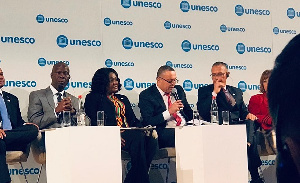- Home - News
- Polls
- Year In Review
- News Archive
- Crime & Punishment
- Politics
- Regional
- Editorial
- Health
- Ghanaians Abroad
- Tabloid
- Africa
- Religion
- Election 2020
- Coronavirus
- Photo Archives
- News Headlines
- Press Release
General News of Wednesday, 27 November 2019
Source: Ministry of Tourism, Arts and Culture
Ghana re-elected to UNESCO Executive Board - Minister
On 19 November 2019, UNESCO hosted the Forum of Ministers of Culture, a major event to discuss the central place of culture in public policies around the world and its impact on sustainable development.
The Minister for Tourism, Arts and Culture in Ghana, Honourable Barbara Oteng Gyasi was in attendance were more than 120 Ministers and high ranking representatives were present to mark a high point during the 40th session of the General Conference of UNESCO (12-27 November 2019).
UNESCO, the only United Nations agency for culture, is returning to the tradition of ministerial meetings in the field of culture, 21 years after the Intergovernmental Conference on Cultural Policies for Development held in Stockholm, Sweden in 1998.
In response to contemporary changes, UNESCO is strengthening its multidisciplinary scope and addressing the issue of sustainable development in a comprehensive manner by emphasizing the linkages between culture and social, economic and environmental issues. On the occasion of the Forum of Ministers of Culture, Ministers will share their views through interactive exchanges to present their cultural policy priorities and visions for the future in response to the challenges and opportunities of contemporary societies.
The Honourable Minister, as part of the forum objectives shed light on the policies and projects that the country Ghana had in place with regards to culture. She shared some public policies that was implemented to reduce inequalities of access to culture saying, “Ghana’s Cultural Policy is being reviewed to accommodate modern development trends after 14 years of its promulgation. It is expected that the policy review will take into account the implementation of international cultural agreements.”
She further added that, “To increase public access to culture, the government supports a number of traditional festivals and cultural programmes among the many ethnic groups of Ghana. The diversity of richness of our culture is thus showcased all year round and national unity is fostered.”
The Honourable Minister then cited some celebrations that fell in line with the ease of access of culture publicly within Ghana by saying. “In addition, the government has instituted public cultural celebrations across the country such as the 2019 Year of Return which UNESCO supported; the National Festival of Arts and Culture, the Pan African and Historical Theatre Festival (PANAFEST) and the Emancipation Day celebrations which is open to all Africans both on the continent and in the diaspora.”
During the forum discussion, the Honourable Minister talked of synergies between cultural policies and other areas of public policy when she was asked and she mentioned, “In Ghana, taking cognizance of the fact that culture is cross cutting, the Ministry is also in charge of tourism, effectively marrying these two importance sectors of development, with particular emphasis on sustainable tourism.”
As a platform for priority setting and public policy development, this ministerial meeting was an opportunity to make decisive progress on the role of culture in development. In the field of culture, the ministerial meetings organized by the Organization in the 1980s and 1990s gave rise to founding concepts, which subsequently fed into the elaboration of major cultural conventions.
In particular, they have made it possible to broaden the concept of culture to include intangible cultural heritage and cultural diversity, and to define a global agenda for cultural policies.
Ghana was re-elected onto the UNESCO Executive Board with the highest vote of One Hundred and Sixty-two (162) in its electoral group. Ghana's group included Kenya, Senegal, Benin, Namibia, Guinea, Togo, D.R. Congo, etc.
Entertainment










